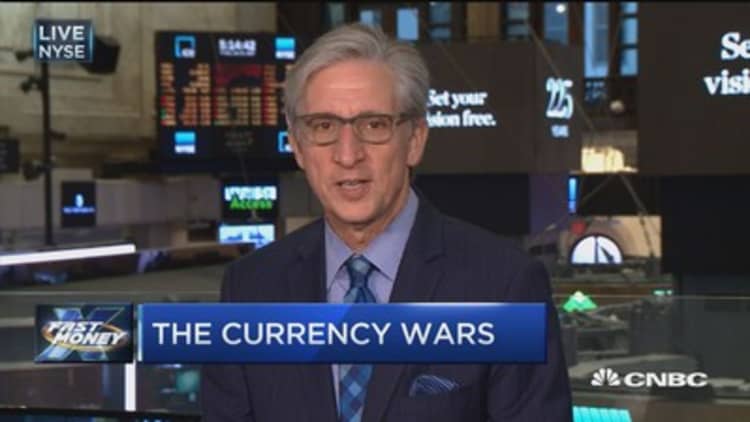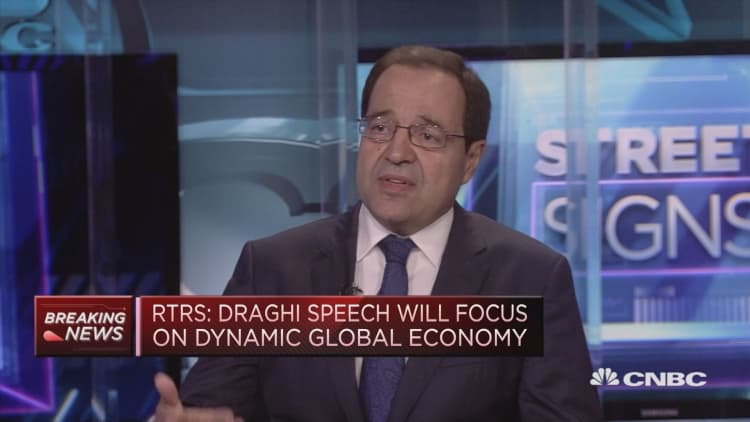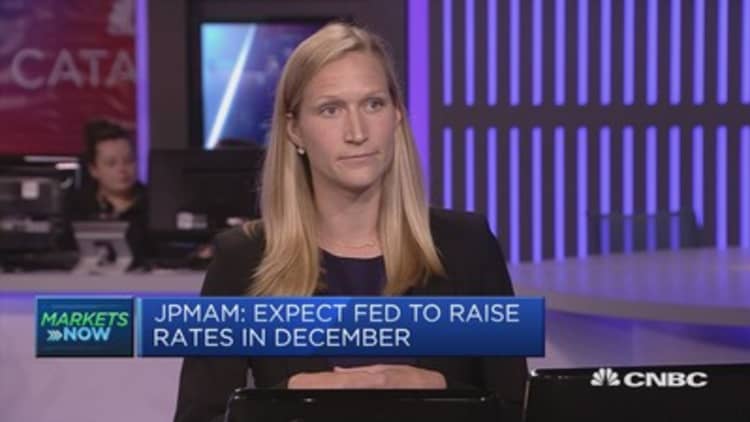Financial markets should brace themselves for a currency war if the European Central Bank and the U.S. Federal Reserve don't coordinate their policies, according to a portfolio manager.
Alberto Gallo, head of macro strategies at Algebris Investments and portfolio manager for the Algebris Macro Credit Fund, told CNBC last week that it is important for central banks to synchronize efforts as we head out of the low interest rate environment.

"We're going to an environment of lower marginal stimulus but unwinding their (ECB and Fed) balance sheets will be very hard. If you don't do it in a synchronized way, there's going to be a currency war," he warned. Gallo has written extensively in the past about the concept of "QE infinity" - a situation whereby low rates and seemingly endless rounds of bond-buying programs encourage cheap borrowing and investment in financial markets.
"What we have seen over the past few weeks is an example. The euro rapidly appreciated to over $1.18 after the Fed turned more dovish, as confirmed by the latest ECB minutes. In turn, this can hurt euro zone exports, effectively redistributing inflation back to the U.S. and other countries, and forcing the ECB to step back on tapering too."
A stronger euro makes European products more expensive for consumers outside the region, including U.S. consumers. Last week, .

"The result of a currency war can be a race to the bottom, where each central bank is afraid of making the first step and exiting quantitative easing (government's bond-buying program) becomes incredibly difficult," Gallo explained.
We're worried about fiscal stimulus delivery in the U.S.Alberto GalloHead of macro strategies at Algebris Investments
The positive economic data seen in the euro zone and in the United States has led the respective central banks to communicate they will be looking at easing their monetary stimulus – which involves central banks purchasing government debt and lowering interest rates to increase the money supply in the economy.
But doing so and thus reducing the size of government debt in their balance sheets will be a challenge as years of monetary stimulus has got policymakers, investors and the global economy used to the concept of low interest rates.
Can a currency war happen?
Currency wars happen when a country, or group of countries, seek to gain a trade advantage by depreciating their currencies on purpose in relation to other currencies.
However, in this case, analysts have warned that a currency war between the euro and the U.S. dollar could spark if the Fed suddenly becomes more dovish, meaning that it delays the path to a rate hike, which in turn could make the .
"We're worried about fiscal stimulus delivery in the U.S. If the Trump administration doesn't deliver then the Fed becomes more dovish, which means there's not going to be enough dry powder (cash reserves) to overcome the next recession," Gallo said.
During his campaign, President Trump promised tax cuts and big infrastructure investments, which are viewed by investors as a means to boost the economy. However, optimism has run out in the markets as Trump hasn't delivered on any of these fronts yet, which raises doubts over whether these policies will ever see the daylight.

In fact, markets have started seeing the about the future of the U.S. economy. The central bank said in July that inflation – one of the key economic metrics for the bank - was "running below 2 percent" whereas in June it said inflation was "running somewhat below 2 percent." Markets perceived this as a more dovish stance and the dollar fell.
The was at 93.515 on Friday. As Jane Foley, a head of fixed income at Rabobank explained "in net terms the (which compared the dollar against a basket of currencies) is around 4.6 percent lower than its November election level."
Last week, minutes from the last – giving further ground to claims of a more dovish Fed.
Fears that QExit will damage central banks' balance sheets...are largely unfounded.Paul SheardChief economist at S&P Global
Is it an exaggeration?
However, not everyone believes that we could be on the brink of a currency war. Nick Gartside, CIO of fixed income at JP Morgan Asset Management told CNBC that talk of a currency war "is an exaggeration."
"We're still very early on the Trump presidency and the U.S. economy is strong," he said, easing concerns over President Trump's ability to put forward with key campaign pledges.
Recent data such as the U.S. nonfarm payrolls or jobs numbers as they are often called - another key metric for the Fed when deciding where to take monetary policy - beat expectations earlier this month. . June's employment numbers were also revised higher.
Gartside added that both the Fed and the ECB "have been good in communicating" they will be reducing their balance sheets. The Fed could announce a move next month and the ECB will follow "later on," he said.
Paul Sheard, chief economist at S&P Global, said in a note on Friday that "fears that QExit (quantitative easing exit) will damage central banks' balance sheets and interfere with monetary policymaking are largely unfounded."
It "is likely to be largely an innocuous process," he said.
However, the process of exiting QE is not an easy one. Both the Fed and the ECB have a big task on their hand. . According to data from the Financial Times, six major central banks around the world now hold more than $15 trillion of assets. Of this, more than $9 trillion is government bonds.


